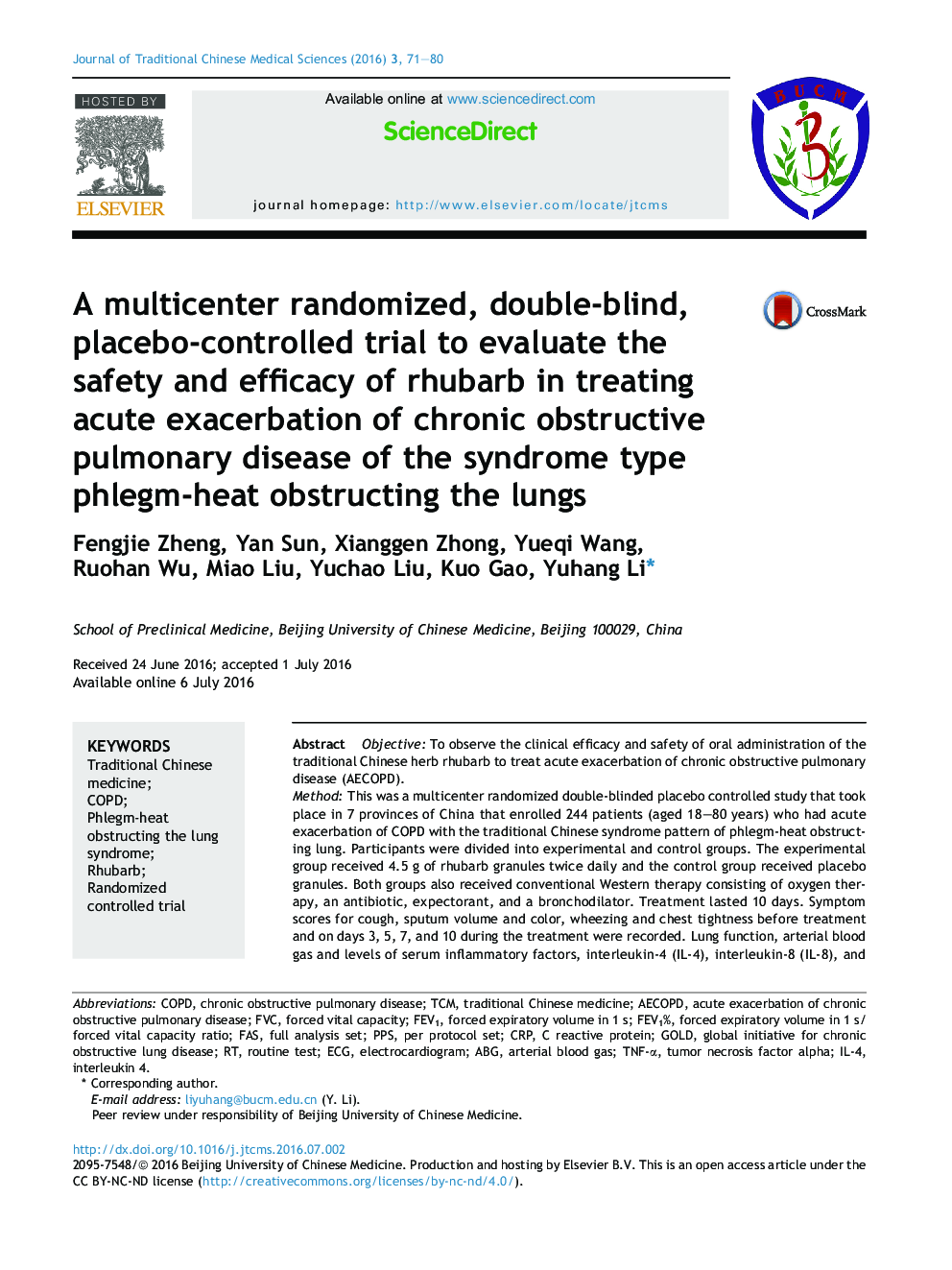| کد مقاله | کد نشریه | سال انتشار | مقاله انگلیسی | نسخه تمام متن |
|---|---|---|---|---|
| 1993083 | 1541183 | 2016 | 10 صفحه PDF | دانلود رایگان |
کلمات کلیدی
علائم اختصاری:
مقدمه
روش ها
اصول اخلاقی و ثبت آزمون
طراحی مطالعه و شرکت کنندگان
تصادفی سازی و کورسازی
معیارهای تشخیصی
معیارهای ورود و خروج
معیارهای انصراف (قطع همکاری)
درمان
درمان مرسوم
درمانهای تجربی و دارونما
اندازهگیری نتیجه
نتایج اولیه
نتایج ثانویه
آنالیز آماری
نتایج
جمعیت مورد مطالعه
نتایج اولیه
نتایج ثانویه
بحث
نتیجه
شکل ها و جداول
ObjectiveTo observe the clinical efficacy and safety of oral administration of the traditional Chinese herb rhubarb to treat acute exacerbation of chronic obstructive pulmonary disease (AECOPD).MethodThis was a multicenter randomized double-blinded placebo controlled study that took place in 7 provinces of China that enrolled 244 patients (aged 18–80 years) who had acute exacerbation of COPD with the traditional Chinese syndrome pattern of phlegm-heat obstructing lung. Participants were divided into experimental and control groups. The experimental group received 4.5 g of rhubarb granules twice daily and the control group received placebo granules. Both groups also received conventional Western therapy consisting of oxygen therapy, an antibiotic, expectorant, and a bronchodilator. Treatment lasted 10 days. Symptom scores for cough, sputum volume and color, wheezing and chest tightness before treatment and on days 3, 5, 7, and 10 during the treatment were recorded. Lung function, arterial blood gas and levels of serum inflammatory factors, interleukin-4 (IL-4), interleukin-8 (IL-8), and interleukin-10 (IL-10) and tumor necrosis factor-alpha (TNF-α), before and after treatment were measured.ResultsThe sample size of the full analysis set (FAS) was 244 participants, and the sample size of per protocol set (PPS) was 235. Following 10 days' treatment, symptom scores of the experimental group were markedly lower than those of the placebo group (FAS: mean difference −1.67, 95% CI: –2.66 to −0.69, P = 0.001; PPS: mean difference −1.55, 95% CI: −2.56 to −0.54, P = 0.003). Lung function in the experimental group was significantly higher than in the placebo group (FEV1, FAS: mean difference 0.12, 95% CI: 0.06 to 0.18; P < 0.001; PPS: mean difference 0.12, 95% CI 0.05 to 0.18; P < 0.001. FVC: FAS: mean difference 0.16, 95% CI: 0.06 to 0.26; P = 0.002; PPS: mean difference 0.16, 95% CI 0.05 to 0.26; P = 0.003. FEV1%, FAS: mean difference 5.95, 95% CI: 3.36 to 8.53; P < 0.001; PPS: mean difference 5.92, 95% CI 3.28 to 8.56; P < 0.001.). PaO2, PaCO2, as well as serum inflammatory factors were also improved when compared to the placebo group. There were no significant differences in the incidence rate of adverse reaction between the two groups.ConclusionsCompared with placebo, rhubarb granules significantly reduced symptom scores, improved blood oxygen level, controlled systemic inflammatory response, without significant adverse effects. Thus, rhubarb may be a beneficial adjuvant method for treating the phlegm-heat obstructing the lung syndrome pattern of AECOPD.
Journal: Journal of Traditional Chinese Medical Sciences - Volume 3, Issue 2, April 2016, Pages 71–80
